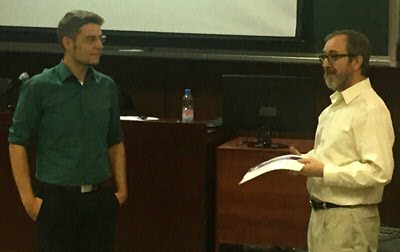Dr. Ruven Fleming gave an `Introduction to Energy Law´ in Kazakhstan
On 10 July 2017 Dr. Ruven Fleming, Assistant Professor in Energy Law, gave a lecture titled `Introduction to Energy Law´ in Almaty, Kazakhstan. He was invited by KIMEP University, a western-style University, located in the former capital of the country Almaty. Kazakhstan witnessed a natural resources boom over the last 20 years and is currently starting to diversify its energy industry.

Dr. Fleming introduced the discipline of Energy Law to students at KIMEP by highlighting the main aspects of the subject. His lecture span from International Energy Law and the particular European perspective on Energy Law over Energy Investment and Trade Law to the regulation of Renewables. He focussed particularly on the interaction between energy and climate law to provide an outlook on future trends in energy regulation.
At the end of the lecture the Dean of the Law Faculty at KIMEP University, Professor Joseph Luke, encouraged students to pursue a career in energy law. He portrayed the area as an emerging and very dynamic field of law that requires a sophisticated set of tools and specialized knowledge. Finally he thanked Dr. Fleming for the lecture and presented him with a certificate of appreciation.
| Last modified: | 18 January 2024 1.49 p.m. |
More news
-
22 April 2025
Impact | Online advice about right to freedom of assembly
In the coming weeks the nominees for the Ben Feringa Impact Award 2025 will introduce themselves and their impactful research or project. This week: Noor Swart and Berend Roorda, on their online information initiative on the right of freedom to...
-
22 April 2025
How do you shield yourself from Big Tech's power?
How can we all become less dependent on Big Tech? A topical and urgent question that is also arising within the University. Recently, a petition by a group of staff members made the rounds that called for the University to break away from Google and...
-
15 April 2025
The Faculty of Law launches podcast The Right to News
On 16 April 2025, the Faculty of Law at the University of Groningen will launch the first episode of its podcast The Right to News (in Dutch: Recht op Nieuws). The theme of the first episode is: “Can the government just ban organizations in the...
